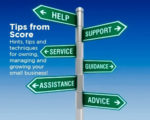Cash Management During Startup
 Question: How can I be smart about managing my cash during the start-up phase of my business?
Question: How can I be smart about managing my cash during the start-up phase of my business?
Answer: As an entrepreneur, you can have the most fantastic business idea, but without adequate cash management planning the business might be like 50% of others who fail due to cash mismanagement
Marc Price co-author of “Business Finance Basics” (Nova Vista, 2014) shared five common financial management mistakes small business owners make, and how to avoid these errors.
- Not having enough cash reserves. Entrepreneurs know that they’ll probably need cash to invest in the start-up of their business, but it may take several fiscal quarters to realize a steady income from the company, let alone to make a profit. Before creating a Business Plan, you should generate a Source and Use of Cash analysis. That way you will start with adequate operating cash. Don’t fool yourself into wishful thinking that the money will somehow be there. Being a seasonal economy with the majority of the income producing time between April and October, you will need to plan for the needs in the off-season when you are operating at a much slower place so you can make it to the
- Being plastic dependent. Some small business owners are forced to turn to credit cards for early stage survival, especially when they haven’t planned properly. Credit cards carry a high- interest charge and annual fees. Before using credit cards to finance your business, consider the various sources of capital that are available to you. You have options: a family bridge loan, a variety of small business (SBA) loan options. A capital infusion or your savings will ensure having sufficient operating capital and can save you from getting into credit card
- Mixing personal and business finances. On the fundamental axioms of business is to keep your personal and business finances totally separate. It’s tempting to cross the line, but keep these two entities completely separate. It makes it easier for accounting, budgeting and reconciling both sets of books, and assists in determining actual profits and losses for the
- Shorting yourself on compensation. When you create your Source and Use of Funds analysis, you need to include a line in the Use section for owner’s compensation. Even if it is a smaller amount than you might like, paying yourself is both a structural and emotional must. In the early stages of business, it may seem like a solid decision to redistribute any and all of your profits back into your business. But not compensating yourself along the way could harm your personal finances and good financial standing. It also is very deflating to know that you are working 24/7 and not generating anything in
- Not having an organized accounts receivable system. One the fundamental principles of cash management are managing your accounts receivables before your first sale. Print your payment terms on the back of every invoice, and follow a clear process in collecting payments. Negotiate your terms of payment with every client so that there is no misunderstanding. Cash on completion of the work, invoicing after completion with payment on receipt, Net 30 days (for long term customers or commercial accounts). Invoice immediately. Make sending prompt
reminders part of your business. Getting behind in your receivables is the easiest way not to have cash when you need it.
Price said his best advice to new and aspiring entrepreneurs is to learn from fellow business owners and financial professionals. “Learning from others can never be underestimated,” Price said. “Make it a habit to reach out to other small business owners and ask for advice and opinions on their previous experiences. Additionally, seek out industry professionals [such as lawyers, accountants, bankers and real estate experts] to help guide you through the labyrinth of the endless financial pitfalls that could be looming. This process greatly mitigates your failure rate and puts you on a proper path for financial success.”
Source: Marc Price’s article was originally published on Business News Daily.
Have a question about common money mistakes? Connect with a Cape Cod SCORE mentor. www.capecod.score.org











